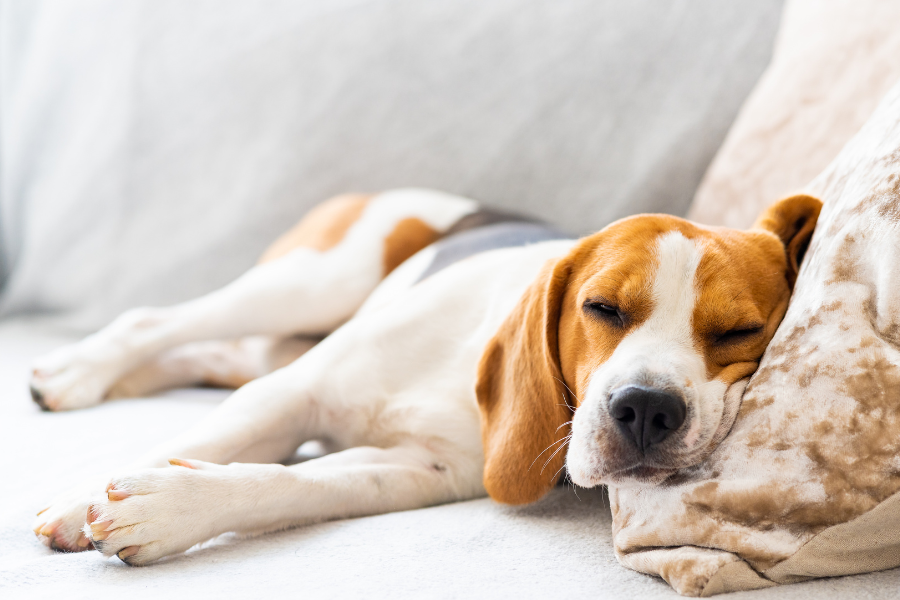We’ve all been there—tossing and turning all night, staring at the ceiling, wondering why sleep is so elusive. But did you know that dogs can experience those restless nights, too? Yep, our furry best friends can also struggle with insomnia. And trust me, it’s not fun seeing your pup pacing the house at 2 AM while you’re desperately trying to catch some z’s.
If you’re wondering “Can dogs really have insomnia?”, the answer is yes. Whether it’s due to anxiety, medical issues, or something as mundane as a weird noise outside, dog insomnia is real. But don’t panic! I’m going to walk you through why this might be happening to your dog, how to recognize it, and more importantly, how you can help your pup catch those Zs again.
What is Dog Insomnia?
First, let's be clear—dogs love sleep. If you’ve ever watched your dog snoozing in the sunshine or napping on the couch for hours (fun fact - our dog howls in her sleep frequently), you know exactly what I’m talking about. Most dogs need anywhere from 12 to 14 hours of sleep a day, depending on their age and activity levels. Puppies and senior dogs might even need more!
Insomnia, or deviations from normal sleep-wake cycles in dogs happens when they consistently can’t get the sleep they need. Instead of snoozing away the day or curling up for a good night's rest, they’re restless, alert, or maybe even looking to you for help. It’s important to address this issue because, just like us, lack of quality sleep can harm a dog’s overall health.
Why Would a Dog Have Insomnia?
Understanding why your four-legged friend can’t sleep is the first step to solving the issue. Here are some of the most common reasons dogs might struggle with insomnia:
1. Anxiety and Stress
Dogs are emotional creatures (we’ve all seen those puppy-dog eyes). Big changes—like moving to a new home, a new pet in the household, or hearing loud noises like fireworks—can leave your dog feeling anxious. And guess what? That anxiety can keep them up at night.
2. Pain or Discomfort
Sometimes, insomnia is a signal that something more serious is going on physically. If your dog has arthritis, an injury, or another medical condition, the discomfort may prevent them from getting comfortable enough to sleep.
3. Medical Conditions
Conditions like allergies, urinary issues (hello, frequent potty breaks!), or cognitive dysfunction in older dogs can disrupt sleeping patterns. If you notice other symptoms alongside insomnia, it’s best to get your dog checked out by a vet.
4. Lack of Exercise
Ever have a day when you skip the gym and then lie awake all night feeling jittery? Dogs can experience the same thing. If they haven't burned off their energy, they might end up restless when they should be winding down.
5. Environmental Factors
Changes in their environment—like a too-hot room, an uncomfortable bed, or even unfamiliar smells—can make your dog feel unsettled. Dogs are sensitive to their surroundings, so even small changes can throw them off their sleep game.
6. Age-Related Sleep Issues
Senior dogs, in particular, can experience trouble sleeping. Just like humans, older dogs may develop cognitive issues or changes in their sleep cycle as they age.
Signs Your Dog Might Have Insomnia
Okay, so how do you know if your pup has insomnia? Here are some tell-tale signs to look out for:
- Pacing around the house at odd hours
- Whining or barking during the night
- Difficulty settling down, even in their favorite sleeping spot
- Staying awake when they would usually be napping during the day
- Looking tired but unable to relax (we’ve all been there, right?)
- Excessive yawning or seeming irritable
If you’ve noticed one or more of these behaviors, insomnia might be the culprit.
How to Help a Dog with Insomnia
We all want our dogs to be happy and well-rested—because a tired dog is usually a cranky one (and so is their human!). Here’s a list of things you can do to help your dog sleep better.
1. Stick to a Routine
Dogs thrive on routines, so if their schedule has been off lately (like meal times or walks happening at random times), try getting back to a consistent daily rhythm. Regular exercise, feeding times, and bedtime routines can help signal to their brain that it’s time to relax and sleep.
2. Create a Relaxing Sleep Space
Make sure your pup has a quiet, cozy spot to sleep. A comfy dog bed in a dim, quiet area can work wonders. If environmental noises keep them up, consider using a white noise machine or calming music to block out distractions.
3. Use Natural Remedies
For dogs who just can’t settle down, some natural sleep aids can help:
- Melatonin: It’s a naturally occurring hormone that regulates sleep cycles, and it’s safe for dogs in proper doses. Always check with your vet before giving it to your pup!
-
Tryptophan: Yes, the same stuff in turkey that makes us all sleepy—it can help dogs relax too. Some dog supplements include tryptophan to promote calmness.
- Lavender Aromatherapy: A little lavender essential oil in the air (not directly on your dog) can create a calming environment.
4. Consider Calming Dog Products
There are plenty of calming aids on the market designed just for dogs. From pressure vests that mimic a hug to CBD treats designed to relieve stress, these can be a great option for dogs with anxiety-related insomnia.
5. Give Them Plenty of Exercise
If your dog isn’t getting enough physical or mental exercise during the day, they might struggle to wind down at night. Take them for an extra walk, throw around a frisbee, or engage their brain with puzzle toys before bedtime.
6. Rule Out Medical Issues
If basic changes and natural remedies don’t do the trick, it’s time to visit the vet. Your vet can check for underlying issues—like arthritis, allergies, or other conditions—that may be causing your dog’s insomnia.
When to Seek Professional Help
If your dog’s insomnia persists despite your efforts, don’t hesitate to reach out to your veterinarian. Chronic sleep issues can sometimes signal underlying health problems that require more specialized care. It’s always better to be safe than sorry!
Final Thoughts
Seeing your beloved furry companion struggle with insomnia can be tough, but with a little patience and the right approach, you can help them get back to snoozing happily in no time. Whether it’s adjusting their routine, creating a calming sleep environment, or trying natural remedies like melatonin or tryptophan, there are plenty of ways to give your dog the peaceful rest they deserve.
And hey, speaking from personal experience, when your dog is well-rested, your whole household benefits. Sweet dreams to you and your pup!
References
1) Woods, H.J., Li, M.F., Patel, U.A. et al. A functional linear modeling approach to sleep–wake cycles in dogs. Sci Rep 10, 22233 (2020). https://doi.org/10.1038/s41598-020-79274-2



